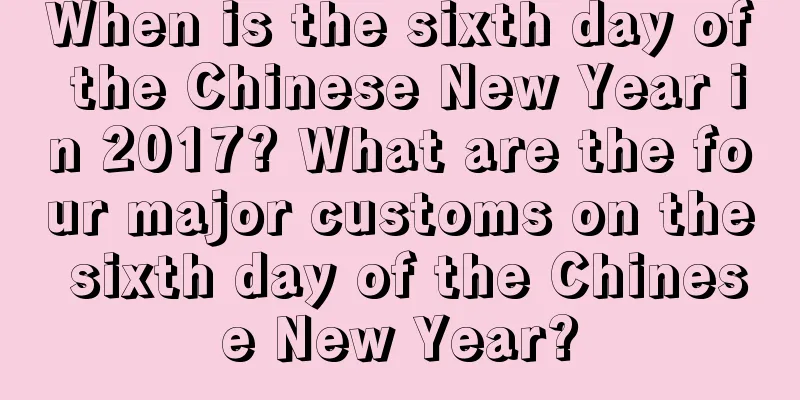When is the sixth day of the Chinese New Year in 2017? What are the four major customs on the sixth day of the Chinese New Year?

Introduction: Do you know what day is the sixth day of the Chinese New Year in 2017? The sixth day of the Lunar New Year is the second to last day of the statutory Spring Festival holiday. Perhaps many people are busy packing their luggage and preparing to return home. There are four major customs in celebrating this day among the people. What are these four customs? Now, please follow the editor to learn more about it! In addition to the grand and festive celebrations of the Spring Festival, we also need to pay attention to some taboos regarding the Spring Festival. Next, let’s take a closer look at the Spring Festival special topic compiled by Mr. Shui Mo!When is the sixth day of the Chinese New Year in 2017?The sixth day of the Chinese New Year in 2017 is February 2, Thursday. Suitable for: accepting marriage proposal, making an engagement, offering sacrifice, seeking offspring, and getting out of trouble. Unsuitable for: praying for blessings, getting married, building temples, setting up beds, and thanking the earth.Four traditional customs on the sixth day of the Lunar New YearCustom 1: Send away the poor ghostOn the sixth day of the Lunar New Year, people offer pancakes, banana boats, light candles and send the poor ghosts on their way. The sixth day of the first lunar month is the horse, which means sending away the poor ghost. Legend has it that the Goddess of Poverty was Jiang Ziya's wife. In order to prevent the Goddess of Poverty from entering their homes during the Spring Festival, people hang red notes on their doors to ward off her. At some point, Beijing's God of Poverty became a male and became the god worshipped by porters. On this day, housewives of the house have to throw out the garbage accumulated during the festival, which is called sending away the ghost of poverty. The hanging notes on the door can also be taken down and thrown out at the same time, which is called sending away the god of poverty. The most popular people on this day are boys who turn 12 years old that year. 12 is twice 6, which can be called a lucky number. It is also said that Liu Hai, the God of Fortune, is a Beijing native, a fat boy dressed in red and green. There is a folk saying that "Liu Hai plays with the golden toad and catches money at every step." Boys who are in their zodiac year, dressed with bangs, carry five little figures cut out of white or colored paper on their backs and go to the streets. Whoever grabs the figure is considered the God of Wealth, and the one whose figure is not grabbed is called the poor ghost. If two people who are both born in their zodiac year meet, whoever grabs the villain behind the other first will have good luck. There are also people who use small cloth bags to throw out as poor ghosts. Both parties have to carry a small basket behind their backs. The one who throws the small bag into the basket behind the other side first throws the poor ghost first, which is auspicious. Today's traditional national sport "hunting" developed from the game of "throwing the poor ghost and grabbing the god of wealth". Unfortunately, this activity still exists in Liaoning, but is rarely seen in Beijing. On that day, vendors go out on the street because it is the Horse Day, and the family should buy "Ludagun" for the "poor" boy to eat.Custom 2: FertilizerThe sixth day is the Horse Day, which was called Yifei in ancient times. Since the beginning of the first lunar month, the toilet cannot be cleaned until the fifth day, and feces accumulate in the toilet. So on this day, a major cleaning must be done, and sacrifices must be made to the toilet god to clean the usually dirty toilet. That’s why it’s called “挹肥” (but nowadays most families use new bathroom equipment, so this custom no longer exists). This day also indicates that farmers in the old days began to go to the fields on this day to prepare for spring ploughing. In Chinese folk beliefs, it is generally believed that the toilet god is Zi Gu, who is also known as Zi Gu, Toilet Gu, Mao Gu, Keng Gu, Dong Shi Niang, etc. Since the Ming and Qing Dynasties, Zi Gu is no longer simply a toilet god. People say that she can predict the future and has foresight. She is often worshipped at home and can predict various things, becoming one of the great gods who practice divination. The Hakka people commonly call the Zi Gu Goddess as Qijie or Qigu. On the sixth day of the first lunar month, the Hakka people worship Zi Gu after drinking milk for three reasons: first, to pray for a good harvest; second, to thank God for his grace; and third, to divine good or bad luck. After cleaning or sanitation of toilets and other sanitary places, Hakka women will light red candles or tea oil lamps in front of the door of the place, burn incense sticks to worship, and paste red paper on the lintel or door frame to indicate auspiciousness.Custom 3: Good luck in opening the marketOn the sixth day of the Lunar New Year, shops and restaurants officially open for business, and firecrackers are set off, just as loudly as on New Year's Eve. The sixth day of the first lunar month was the day when all businesses, big and small, would "open for business" in the old days, and a big red couplet with the words "Good luck in opening the business, and everything will go well" would be posted on the door panels. Firecrackers are set off before opening to bring good luck. Some families find a "complete person" (a woman with a husband, children, and parents-in-law) to go around each room and say auspicious words before opening the market on the sixth day of the Lunar New Year, such as "good luck in opening the market, more than enough blessings, everything will be safe, make more money, and earn enough gold and silver to fill a kang", etc. Before the market opens, it is taboo for women from other families to visit one's home. After the market opens, all Spring Festival taboos end, everything returns to normal, and neighbors can resume visiting and interacting with each other. Put one or more large pots of oranges in front of the stall. There must be a lot of oranges, otherwise there will be more empty spaces than oranges (homonymous in Cantonese as "more bad luck than good"), which is a bad omen.Custom 4: 3, 6, 9, walk outOn the sixth day of the Lunar New Year, people should go out for fun. If they consciously plan their walking route to form a circle, it is said to bring good luck in the new year.Summary: After reading the above article, we know the date of the sixth day of the Lunar New Year in 2017, and also know the four traditional customs of the sixth day of the Lunar New Year. I hope you can understand it. If you want to know more, please visit Mr. Shui Mo! After reading this article, there are more exciting content in the Spring Festival special topic, let’s take a look! |
<<: When is the beginning of spring in 2017?
Recommend
What is the origin of New Year’s Day? How do you say Happy New Year in English?
Many people are celebrating New Year's Day in ...
Is the eighth day of the tenth lunar month in 2021 an auspicious day? Can I pick up the new car today?
The tenth month in the lunar calendar indicates th...
Is the 17th day of the 11th lunar month in 2018 a suitable day for renovation? Is the omen on this day good?
Introduction: In our country’s tradition, it is ge...
Check the specific location of the God of Happiness on September 24, 2019!
Direction refers to the direction you are in. We ...
What are the do's and don'ts for the Grain Rain solar term on March 20, 2022? Is it an auspicious day? Is it suitable for starting work?
The third month of the lunar calendar is also call...
What is the date of July 21st in the lunar calendar in 2017? What day is it?
What day is July 21st in the lunar calendar 2017?...
Is it a good time to start renovation on the sixth day of the eleventh lunar month in 2017?
Introduction: A house is where people spend most o...
What are some great and famous people born on the summer solstice? What are the climate characteristics of the summer solstice?
The summer solstice is a turning point of the sun....
What are the do’s and don’ts on the fourth day of the first lunar month in 2018?
What day is the fourth day of the first lunar mon...
How are people celebrating their birthdays on Christmas Eve 2021? Is it unlucky to be born on Christmas Eve?
Many people celebrate their birthdays every day, s...
If you want to have a baby in June of the lunar calendar in 2021, which month will the baby be born?
It takes a certain amount of time for the baby in ...
Is June 11th of the lunar calendar 2019 a suitable day for moving?
Moving on an auspicious day will bring good luck,...
What is suitable to eat to keep warm during Xiaohan? Ways to beat the winter cold
Minor Cold is a weather-related solar term. On thi...
Is it good to be born in April of the lunar calendar in 2021? Which day is the best to be born?
Green locust trees and tall willows are swallowing...
Is it an auspicious day to get married on the 25th day of the twelfth lunar month in 2018?
The twelfth lunar month is the month closest to th...









